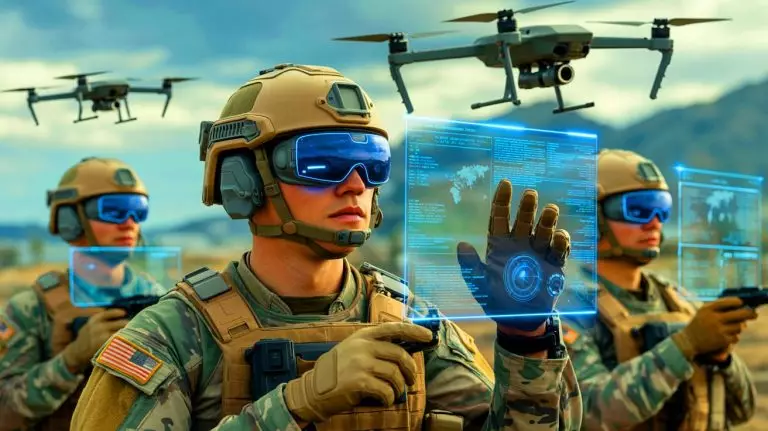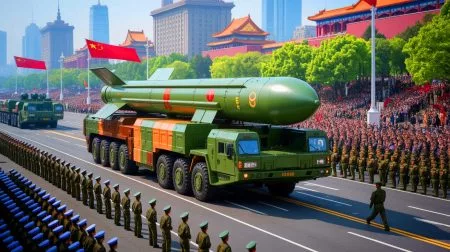| IN A NUTSHELL |
|
As the dynamics of modern warfare evolve, companies like Meta and Anduril Industries are at the forefront of integrating cutting-edge technology into military operations. With the announcement of their new partnership, these tech giants aim to revolutionize the way American soldiers interact with the battlefield using augmented reality (AR) and artificial intelligence (AI). This collaboration represents a significant shift in how commercial technology intersects with national defense, setting the stage for a future where soldiers could operate as “technomancers” equipped with real-time combat intelligence and autonomous control systems.
Tech Meets Warfare in a New Era of Battlefield Computing
The collaboration between Meta and Anduril Industries introduces a new era in battlefield computing. The focus is on developing wearable technology, such as AR goggles or visors, that will significantly enhance soldiers’ situational awareness and decision-making capabilities. Meta’s hardware and AI tools will integrate with Anduril’s Lattice platform, a sophisticated system that aggregates data from numerous sources to deliver actionable intelligence directly to soldiers on the ground.
Through intuitive AR/VR interfaces, soldiers will interact with this comprehensive data in real time, allowing for unprecedented control and perception in combat situations. Palmer Luckey, Anduril’s founder, expressed that their mission is to transform soldiers into technomancers, highlighting the transformative potential of these advancements. This initiative, privately funded and not reliant on taxpayer dollars, promises to leverage commercial technology for defense, potentially saving billions in military expenditure.
Zuckerberg, Luckey Reunite in High-Stakes Political Climate
This partnership also signifies a reunion between Mark Zuckerberg and Palmer Luckey, who share a history dating back to Luckey’s sale of Oculus to Meta (formerly Facebook) in 2014. Their renewed collaboration comes amidst a politically charged environment, with President Trump serving a second term and tech companies navigating closer ties with the government. Zuckerberg’s frequent visits to the administration underscore Meta’s strategic positioning in the national defense landscape.
Luckey’s departure from Facebook in 2017, following controversy over his political activities, adds a layer of intrigue to this partnership. However, both leaders emphasize the critical importance of utilizing dual-use technology to bolster national defense capabilities. As they embark on this ambitious venture, the fusion of their expertise promises to deliver groundbreaking advancements in military technology.
Meta Expands National Security Footprint
Meta’s collaboration with Anduril is part of a broader strategy to cement its position as a key player in U.S. national security. By aligning its AI and AR technologies with defense initiatives, Meta aims to contribute to U.S. global competitiveness and counter China’s growing tech influence. The company’s open-source Llama AI models are being pitched to defense agencies, reflecting their commitment to supporting national interests.
Alongside Anduril, Meta has submitted a bid for the Army’s SBMC Next contract, formerly known as IVAS Next, and is developing the EagleEye headset to enhance soldiers’ sensory capabilities. Even if the contract bid is unsuccessful, the companies plan to continue their work, underscoring a long-term commitment to military technology innovation. This partnership exemplifies the increasing engagement of Silicon Valley with U.S. defense priorities, with companies like Meta, OpenAI, and Palantir at the forefront of tech-driven national security solutions.
Implications and Future Perspectives
The partnership between Meta and Anduril represents a pivotal moment in the intersection of technology and defense. By harnessing the power of AI and AR, these companies are poised to redefine the capabilities of modern soldiers, offering enhanced situational awareness and decision-making tools. Such advancements have the potential to transform the nature of military operations, presenting both opportunities and challenges.
As commercial technology becomes increasingly integral to national defense, questions arise about the ethical and strategic implications of these developments. How will these advancements impact the future of warfare, and what measures will be taken to ensure their responsible deployment? As we stand at the cusp of this technological revolution, the dialogue surrounding the role of tech in defense will likely continue to evolve, prompting further exploration and innovation in the years to come.
Did you like it? 4.7/5 (22)







What are the potential risks of integrating AR-AI tech in warfare? 🤔
Meta’s getting into the defense game now? What’s next, Zuckerberg for President? 😂
Are there any plans to ensure the ethical use of this technology on the battlefield?
Sounds like a video game come to life! Just hope it’s not game over for humanity.
Interesting partnership, but how does it compare to similar tech from other countries?
Did I read that right? Soldiers will be “technomancers”? That’s quite a title! 🧙♂️
Hope this tech doesn’t glitch at a critical moment. That would be disastrous!
How will this impact the training and roles of soldiers in the future?
Are the soldiers excited about this tech, or are there concerns about privacy and autonomy?
Does anyone else feel like we’re living in a sci-fi movie with this news? 😮
How does this technology address the psychological impact of warfare on soldiers?
Meta jumping into military tech feels like a Black Mirror episode waiting to happen.
Will this new tech reduce the need for ground troops, or just change their roles?
Great article! Curious about how this will affect global military dynamics.
What are the potential civilian applications for this technology? 🤔
Can this tech be hacked to turn soldiers into unwilling cyber puppets? 😱
How do the soldiers feel about being turned into “real-time combat intelligence hubs”?
I’m all for tech innovation, but where do we draw the line with AI in warfare?
Thank you for the information. Looking forward to seeing how this develops.
Is this just another way for Meta to expand its reach into every aspect of our lives?
Is this a move to counter similar advancements by other nations? 🧐
Meta in defense tech… Guess the metaverse wasn’t enough. What’s next?
Thank you for the detailed explanation of the collaboration. It sounds both fascinating and a bit scary.
Will this new technology make soldiers too reliant on AI, potentially affecting their decision-making skills?
How long before we see this tech in action? I’m curious about the timeline.